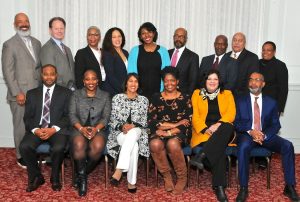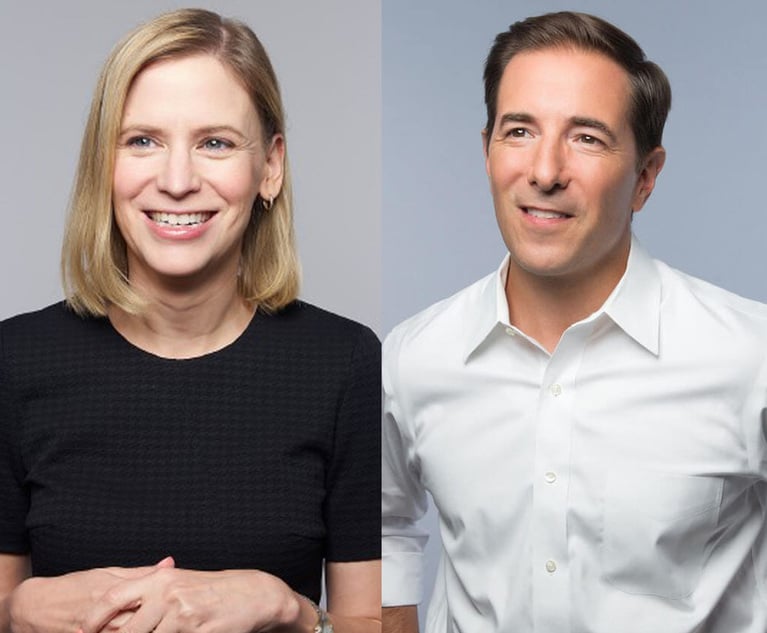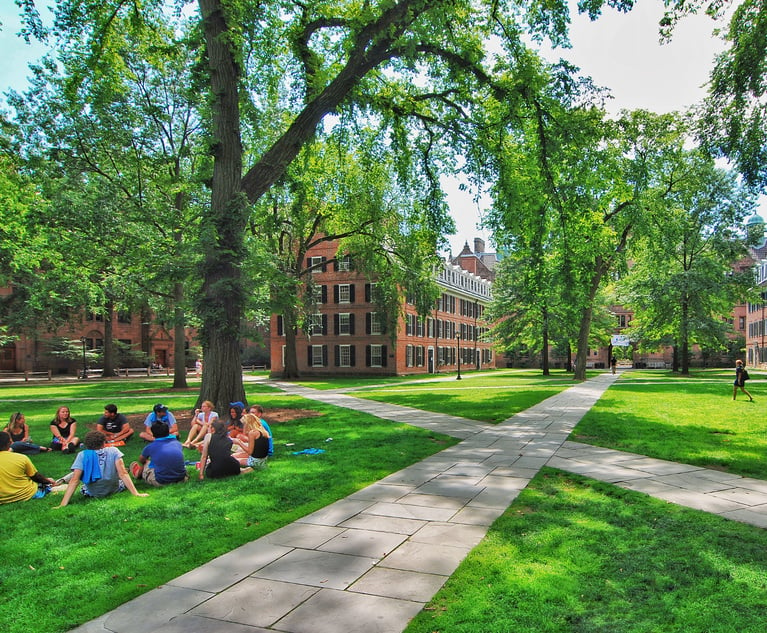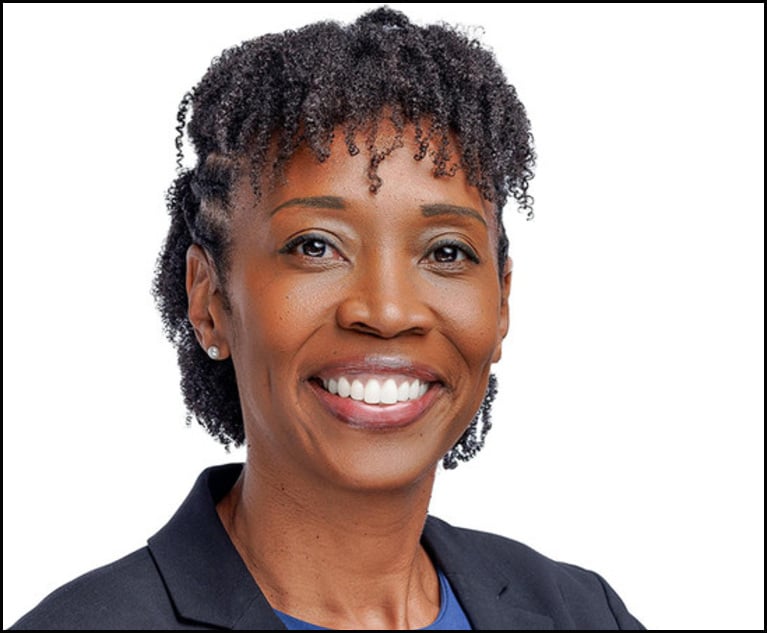Conn. Firms Pushing for Diversity Have Robust Community Partner
The Lawyers Collaborative for Diversity, a Connecticut-based coalition, is dedicated to advancing the careers of young attorneys from multicultural backgrounds.
January 09, 2018 at 04:16 PM
5 minute read

Connecticut law firms working to promote diversity have seen success with the support of nearby law schools, but are struggling to retain associates of color, who tend to migrate to larger markets in search of broader connections and opportunities.
That's a challenge for the Lawyers Collaborative for Diversity, a Connecticut-based coalition dedicated to advancing the careers of young attorneys from multicultural backgrounds. Formed in 2003, the group's first event of 2018 will be a best practices forum Feb. 8 at the Quinnipiack Club in New Haven.
LCD Executive Director Carolyn Golden Hebsgaard, who heads the Boston Lawyers Group and helped launch and began running the Connecticut organization in 2003, said she is pleased with the progress that the group has made, but there are still challenges ahead.
“One of the challenges, I would say, is retention,” Hebsgaard said. “If we are able to identify and recruit and advance attorneys of color in the community, we also need to be able to keep them there long enough in order for the impact to happen. That is a real challenge because, as we sit between New York and Boston, somehow graduating lawyers don't recognize the value of the support they can get right here in Connecticut. They go off to New York or Boston, and it's kind of the same everywhere. Every community in the country is having an issue with retention.”
In an effort to stem the tide, LCD's mission has been to develop a robust multicultural community in Connecticut to demonstrate to member attorneys and firms that an enriched, diverse network is also a stronger one that will last longer. “Many law firms are being pressed by their corporate partners to be more diverse,” Hebsgaard said. “Corporate America is way ahead in terms of having those things in place, and they're passing it on to their vendors. They're saying, 'If you can't get on board, we'll find someone who will,' and that's created a good platform for firms who already have that commitment and would like to see more diversity happen.”
At LCD's Feb. 8 best practices event, the facilitators will seek to move beyond acknowledging the reality that diversity is a widely shared objective and get down to teaching attorneys “what clients want” and “how to get there.” Panelists from corporations dedicated to diversity will share their practices, and they will be joined by a minority business enterprise owner for an inside look at challenges faced by firms committed to workplace diversity.
Hebsgaard said LCD's mission includes a focus on mentoring, which involves more than connecting young attorneys of color with people from similar backgrounds.
“If you're a young person of color, it doesn't matter what the person looks like,” Hebsgaard said. “Many of my mentors have been white males over the years. If you're a white male attorney and you're paired with a black female, here's an opportunity for you to really demonstrate what you're committed to as a firm.”
That also means reaching out to veteran attorneys and partners who are willing to share their knowledge. “I have to say we have pretty good cross-generational involvement, which is nice,” Hebsgaard said. “A lot of our older attorneys are coming and encouraging the younger associates at their firms to participate. If you want younger associates to get involved, they have to feel that spending time away from their desks is valued at the organization. Leadership becomes a messenger for that kind of support, because if an associate thinks they need to be billing time instead of being at UConn for an event, they think there is no value in it for them.”
Last November at the Quinnipiack Club, LCD's annual “Judges of Color” reception drew a standing-room crowd to participate in candid conversation with 15 different Connecticut judges, who offered heartfelt advice and inspiration to attendees. During a round of questions, participating judges reflected on the most important lessons they had learned during their careers.
U.S. District Judge Alvin Thompson of the District of Connecticut, who has served since 1994, was among the honored guests. “One thing I tell attorneys is to make sure you treat everyone you come in contact with with respect,” Thompson said. “You never know who knows who. You'll be surprised, and your reputation gets around. It's so much harder for me to believe a lawyer who has a bad reputation—even if they are making a legal argument that has merit. Keep your reputation pristine. The world is small and you don't know who knows who.”
Superior Court Judge Sibyl V. Richards' comments echoed the spirit of the event, namely that judges are human too. Nominated in 2011 by Gov. Dannel Malloy, Richards said the position has been a lesson in time management. “As much as you try to treat people with dignity, respect and compassion, there is a time constraint. I don't always have the opportunity to do what's in the movies. Things are more rapid-fire. People who come before you have serious issues. No matter how silly or inconsequential it may sound to you, for them it's a serious matter. You need to really focus on the task at hand, pay attention to the litigants and really be prepared to treat each and every case individually.”
Hebsgaard said anyone interested in the Feb. 8 best practices event, mentoring, joining or learning more about LCD can visit lcd-ne.org. A newsletter announcing future events is expected soon.
This content has been archived. It is available through our partners, LexisNexis® and Bloomberg Law.
To view this content, please continue to their sites.
Not a Lexis Subscriber?
Subscribe Now
Not a Bloomberg Law Subscriber?
Subscribe Now
NOT FOR REPRINT
© 2025 ALM Global, LLC, All Rights Reserved. Request academic re-use from www.copyright.com. All other uses, submit a request to [email protected]. For more information visit Asset & Logo Licensing.
You Might Like
View All


DC Lawsuits Seek to Prevent Mass Firings and Public Naming of FBI Agents
3 minute read
Trending Stories
- 1Law School Applications are Up Across the Country. Law Deans Aren't Sure Why
- 2Retention, Development and 'Empowering Teams': This Am Law 200 Firm's Newest Practice Leader Says Objectives Haven't Changed
- 3From Laggards to Tech Founders: Law Firm Innovation Is Flourishing
- 4Judge Receives Supreme Court Reprimand: 'Your Behavior Was Unacceptable'
- 5Contracts Game Changer? One-Sided ADR Provision Overturned
Who Got The Work
J. Brugh Lower of Gibbons has entered an appearance for industrial equipment supplier Devco Corporation in a pending trademark infringement lawsuit. The suit, accusing the defendant of selling knock-off Graco products, was filed Dec. 18 in New Jersey District Court by Rivkin Radler on behalf of Graco Inc. and Graco Minnesota. The case, assigned to U.S. District Judge Zahid N. Quraishi, is 3:24-cv-11294, Graco Inc. et al v. Devco Corporation.
Who Got The Work
Rebecca Maller-Stein and Kent A. Yalowitz of Arnold & Porter Kaye Scholer have entered their appearances for Hanaco Venture Capital and its executives, Lior Prosor and David Frankel, in a pending securities lawsuit. The action, filed on Dec. 24 in New York Southern District Court by Zell, Aron & Co. on behalf of Goldeneye Advisors, accuses the defendants of negligently and fraudulently managing the plaintiff's $1 million investment. The case, assigned to U.S. District Judge Vernon S. Broderick, is 1:24-cv-09918, Goldeneye Advisors, LLC v. Hanaco Venture Capital, Ltd. et al.
Who Got The Work
Attorneys from A&O Shearman has stepped in as defense counsel for Toronto-Dominion Bank and other defendants in a pending securities class action. The suit, filed Dec. 11 in New York Southern District Court by Bleichmar Fonti & Auld, accuses the defendants of concealing the bank's 'pervasive' deficiencies in regards to its compliance with the Bank Secrecy Act and the quality of its anti-money laundering controls. The case, assigned to U.S. District Judge Arun Subramanian, is 1:24-cv-09445, Gonzalez v. The Toronto-Dominion Bank et al.
Who Got The Work
Crown Castle International, a Pennsylvania company providing shared communications infrastructure, has turned to Luke D. Wolf of Gordon Rees Scully Mansukhani to fend off a pending breach-of-contract lawsuit. The court action, filed Nov. 25 in Michigan Eastern District Court by Hooper Hathaway PC on behalf of The Town Residences LLC, accuses Crown Castle of failing to transfer approximately $30,000 in utility payments from T-Mobile in breach of a roof-top lease and assignment agreement. The case, assigned to U.S. District Judge Susan K. Declercq, is 2:24-cv-13131, The Town Residences LLC v. T-Mobile US, Inc. et al.
Who Got The Work
Wilfred P. Coronato and Daniel M. Schwartz of McCarter & English have stepped in as defense counsel to Electrolux Home Products Inc. in a pending product liability lawsuit. The court action, filed Nov. 26 in New York Eastern District Court by Poulos Lopiccolo PC and Nagel Rice LLP on behalf of David Stern, alleges that the defendant's refrigerators’ drawers and shelving repeatedly break and fall apart within months after purchase. The case, assigned to U.S. District Judge Joan M. Azrack, is 2:24-cv-08204, Stern v. Electrolux Home Products, Inc.
Featured Firms
Law Offices of Gary Martin Hays & Associates, P.C.
(470) 294-1674
Law Offices of Mark E. Salomone
(857) 444-6468
Smith & Hassler
(713) 739-1250










